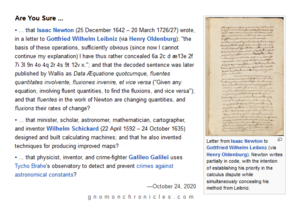October 24: Difference between revisions
(Created page with "{{Selected anniversaries/October 24}}") |
No edit summary |
||
| Line 1: | Line 1: | ||
'''Are You Sure ...''' | |||
{{Are_You_Sure/October 24}} | |||
<br style="clear:both"> | |||
[[File:Are You Sure (24 Oct 2020).png|thumb|left|Screenshot: Are You Sure (October 24, 2020)]] | |||
<br style="clear:both"> | |||
'''On This Day in History and Fiction''' | |||
{{Selected anniversaries/October 24}} | {{Selected anniversaries/October 24}} | ||
Revision as of 14:28, 19 October 2020
Are You Sure ...

• ... that Isaac Newton (25 December 1642 – 20 March 1726/27) wrote, in a letter to Gottfried Wilhelm Leibniz (via Henry Oldenburg): "the basis of these operations, sufficiently obvious (since now I cannot continue my explanation) I have thus rather concealed 6a 2c d æ13e 2f 7i 3l 9n 4o 4q 2r 4s 9t 12v x."; and that the decoded sentence was later published by Wallis as Data Æquatione quotcumque, fluentes quantitates involvente, fluxiones invenire, et vice versa ("Given any equation, involving fluent quantities, to find the fluxions, and vice versa"); and that fluentes in the work of Newton are changing quantities, and fluxions their rates of change?
• ... that minister, scholar, astronomer, mathematician, cartographer, and inventor Wilhelm Schickard (22 April 1592 – 24 October 1635) designed and built calculating machines; and that he also invented techniques for producing improved maps?
• ... that physicist, inventor, and crime-fighter Galileo Galilei uses Tycho Brahe's observatory to detect and prevent crimes against astronomical constants?
On This Day in History and Fiction
1601: Astronomer Tycho Brahe dies. Brahe made astronomical observations some five times more accurate than the best available observations at the time.
1635: Minister, scholar, astronomer, mathematician, cartographer, and inventor Wilhelm Schickard dies. Schickard designed and built calculating machines, and invented techniques for producing improved maps.
1602: Physicist, inventor, and crime-fighter Galileo Galilei uses Tycho Brahe's observatory to detect and prevent crimes against astronomical constants.
1655: Mathematician, astronomer, philosopher, and priest Pierre Gassendi dies. Gassendi clashed with his contemporary Descartes on the possibility of certain knowledge.
1676: Isaac Newton summarized the state of development of his method of fluxions and power series in the "Epistola posterior," which he sent to Oldenburg to transmit to Leibniz.
1861: The first transcontinental telegraph line across the United States is completed.
1920: Mathematician and Doctor of Medicine Marcel-Paul Schützenberger born. Schützenberger will contribute to the fields of formal language, combinatorics, and information theory.








